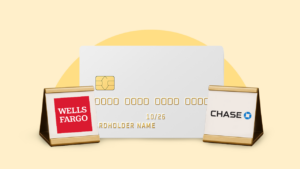Overdraft fees vs. NSF fees: How they differ




Key takeaways
- Overdraft fees ($26.77 average) are charged when banks cover transactions that exceed your account balance, while NSF fees ($16.82 average) apply when banks decline those transactions.
- The main difference: Overdraft fees mean your transaction goes through and you owe the bank money, while NSF fees mean your payment bounces and you still pay a penalty.
- You can avoid both fees by monitoring your balance, setting up low-balance alerts, linking accounts for overdraft protection, or switching to a checking account with no overdraft fees.
- Many banks now offer fee-free checking accounts or have eliminated overdraft and NSF fees entirely — compare your options to stop paying unnecessary penalties.
If you’ve ever spent more than what’s in your checking account, you’ve likely encountered one of two penalties: an overdraft fee or a nonsufficient funds (NSF) fee. While many people use these terms interchangeably, they’re actually different fees charged in different situations.
Here’s what you need to know about both fees and how to avoid them entirely.
The key difference: Does your transaction go through?
The distinction is simple:
- Overdraft fee: Your bank covers the transaction, it goes through, and you’re charged a fee (plus you owe the bank the amount they covered).
- NSF fee: Your bank declines the transaction, it doesn’t go through, and you’re still charged a fee.
| Fee type | Average cost | Transaction clears? | What happens |
| Overdraft fee | $26.77 | Yes | Bank covers the shortfall temporarily. You must repay the amount plus the fee. |
| Non-sufficient funds fee | $16.82 | No | Bank declines the transaction. You pay the fee and your payment bounces, potentially triggering late fees from merchants. |
Both fees are expensive, but at least with an overdraft fee your payment goes through. With an NSF fee, you pay a penalty and your bill still doesn’t get paid.
Ready to stop paying these fees? Compare checking accounts with no overdraft fees to keep more of your money.
What is an overdraft fee?
An overdraft fee is is charged when your bank allows a transaction to process even though you don’t have enough money in your account to cover it. Think of it as a very expensive short-term loan.
Let’s say your account has $75 and you make a $100 debit card purchase. Your bank covers that extra $25 and charges you an overdraft fee — typically around $27. You’ll need to deposit $52 ($25 for the shortfall plus $27 for the fee) to bring your account positive again.
What you need to know:
- Average fee: $26.77, based on Bankrate’s latest checking account fee survey
- Multiple fees possible: Banks can charge 3-4 overdraft fees per day, potentially costing you $80-$100 in a single day
- Charged by 90% of banks: Most checking accounts still assess overdraft fees
- Repayment required: Banks typically give you a few days to bring your account positive before potential account closure
Some banks offer grace periods (often 24 hours) to deposit money before charging the fee. Wells Fargo and other major banks have adopted this consumer-friendly policy.
What is an NSF fee?
An NSF (nonsufficient funds) fee is charged when your bank declines a transaction because you don’t have enough money to cover it.
Say you write a $600 rent check but only have $500 in your account. When your landlord tries to cash it, your bank declines the check and charges you an NSF fee — typically around $17.
What you need to know:
- Average fee: $16.82, according to Bankrate data.
- Declining trend: 39% of checking accounts no longer charge NSF fees
- Double penalty: Beyond the bank fee, you may face returned check fees, late fees and interest charges from whoever you were trying to pay
- Can affect automatic payments: Your car insurance, streaming services and other auto-debits can trigger NSF fees
How to avoid overdraft and NSF fees entirely
Stop throwing away money on unnecessary fees. Here’s how:
1. Switch to a fee-free checking account
The simplest solution: bank somewhere that doesn’t charge these fees. Many online banks and credit unions have eliminated overdraft and NSF fees completely.
Compare your options: See checking accounts with $0 overdraft fees
2. Set up overdraft protection
Overdraft protection automatically transfers money from a linked savings account to cover shortfalls. While some banks charge a small transfer fee ($10-12), it’s better than a $27 overdraft fee. Even better, many banks offer free overdraft protection transfers.
3. Opt out of overdraft coverage
Tell your bank not to allow overdrafts on your account. Your transactions will simply be declined if you don’t have enough money — no fee charged. The downside: your payments won’t go through, which could mean declined cards at the checkout or bounced checks.
4. Monitor your balance obsessively
The old-fashioned approach still works. Set up low-balance alerts through your bank’s mobile app to get notified when your account drops below a threshold (like $100). Check your available balance before making purchases, not just your current balance—pending transactions matter.
5. Keep a cushion
Maintain a buffer of $100-200 in your checking account as an emergency cushion. This simple habit eliminates most overdraft situations.
Can overdraft fees hurt your credit?
Overdraft and NSF fees don’t directly appear on your credit report. However, if you leave your account overdrawn for an extended period, your bank may close the account and send it to collections—which will damage your credit score.
Additionally, overdrawn accounts get reported to ChexSystems, a specialty reporting agency that tracks banking behavior. A negative ChexSystems report can make it difficult to open new bank accounts for up to five years.
If you overdraw your account: Bring it positive within a few days to avoid escalating consequences.
The truth about bank overdraft revenue
While many financial institutions have reduced or eliminated overdraft fees and NSF fees, they still generate significant revenue for many banks. In 2024, nearly $5 billion in cumulative income was earned from overdraft fees from the 10 banks that earn the most in these fees, according to the Consumer Federation of America, an association of non-profit consumer organizations.
Bottom line
Overdraft fees and NSF fees are both expensive penalties for spending money you don’t have, but they work differently. Overdraft fees let your transaction clear while NSF fees bounce your payment. Either way, you’re wasting money.
You don’t have to accept these fees as inevitable. Banks that have eliminated overdraft and NSF fees entirely are widely available, and they work just as well as traditional banks — often better.
Why we ask for feedback Your feedback helps us improve our content and services. It takes less than a minute to complete.
Your responses are anonymous and will only be used for improving our website.




